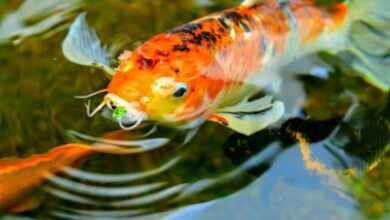How Long Can Betta Fish Go Without Food?⏬

Betta fish, with their vibrant hues and majestic fins, grace many an aquarium with their presence. Known for their resilience and unique personalities, these aquatic beauties are a fan favorite among fish enthusiasts. However, life can be unpredictable, and as pet owners, we might sometimes wonder about the limits of our finned friends’ hardiness, particularly in terms of nutrition. How long can betta fish go without food? This is a crucial question for any betta caretaker, especially when faced with situations like extended vacations or emergency scenarios where regular feedings may be missed. In this comprehensive guide, we’ll dive into the biology of betta fish, understand their metabolic needs, explore the factors influencing their dietary requirements, investigate their survival strategies during periods of food scarcity, and discuss how to monitor their health when they’re not eating. We’ll also look at the long-term implications of fasting on these resilient creatures. Join us as we explore the delicate balance of caring for betta fish during those times when their next meal is just out of reach.Discover the essentials of Betta fish care, including how their metabolism affects feeding, health signs to monitor, and the impact of fasting.
Understanding Betta Fish: An Overview
Betta fish, also known as Siamese fighting fish, are one of the most popular aquarium pets due to their vibrant colors and elegant fins. Native to the shallow waters of Thailand, Cambodia, and Vietnam, bettas are part of the gourami family and are known for their unique labyrinth organ, which allows them to breathe air from the surface. This adaptation is a result of living in low-oxygen environments such as rice paddies and still water ponds.
The care for betta fish usually involves consideration of their environmental needs, such as appropriate water temperature, pH levels, and the creation of a stress-free habitat that mimics their natural environment. Socially, bettas are solitary creatures; especially, the males exhibit high levels of aggression towards each other, which is why they are often housed individually.
Betta fish metabolism and dietary requirements are an integral part of their care. They are carnivorous by nature and in the wild, their diet would consist primarily of insects and larvae. Aquarium bettas are typically fed a diet of pellet or flake food specially formulated for bettas, as well as the occasional treat of live or frozen foods like brine shrimp or bloodworms.
Understanding how long can betta fish go without food is crucial for pet owners, particularly during vacation periods or emergencies. While bettas can survive for a certain period without food due to their survival mechanism, which allows them to slow down their metabolism in times of scarcity, it is not recommended to routinely test this capability as it may lead to health concerns.
Their ability to withstand periods of fasting does not eliminate the necessity for a consistent feeding schedule to maintain their health. Neglecting regular feedings can lead to a weakened immune system and make bettas susceptible to diseases. A proper understanding of betta fish care, including their dietary needs, is essential for promoting a long and healthy life for these striking and personable aquatic pets.
Betta Fish Metabolism And Feeding Basics
Understanding the metabolism and feeding requirements of betta fish is crucial for maintaining their health and vibrancy in a captive environment. As part of ensuring the wellbeing of these beautiful aquatic creatures, many betta owners often ponder the question: how long can betta fish go without food? To address this, one must first grasp the metabolic processes that govern their dietary needs.
Betta fish, with their labyrinth organ allowing them to breathe atmospheric air, have a unique metabolic rate that differs from other fish. This adaptation influences not only their respiratory process but also their digestive system, requiring a balanced diet to sustain their energy levels. Feeding betta fish a variety of foods such as live insects, frozen or freeze-dried feeds, and high-quality pellets can provide the nutrients necessary for their metabolism.
The ideal feeding frequency for betta fish generally revolves around once or twice a day, ensuring they receive enough sustenance without overfeeding. Overfeeding can lead to health issues such as obesity and water quality degradation, which directly impact their metabolic efficiency. Careful monitoring and adherence to a feeding schedule are essential strategies in maintaining the delicate balance of a betta fish’s dietary needs.
Adequate feeding not only supports the metabolic functions but also affects the behavior and stress levels of betta fish. Insufficient nutrition can trigger aggressive behavior and increased susceptibility to diseases, while a well-fed betta is more likely to exhibit vibrant colors and active engagement with its environment. Providing the correct amount and type of food supports their overall metabolism and well-being.
In summary, the metabolic processes of betta fish require attention to detail when it comes to their nutrition. While betta fish enthusiasts may inquire about how long can betta fish go without food, the focus should be on creating optimal feeding routines that support their digestive and metabolic health. This understanding serves as a foundation for nurturing a thriving betta fish that can grace an aquarium with its beauty and vitality.
| Dietary Component | Benefits for Metabolism | Recommended Frequency |
|---|---|---|
| Live Insects | Simulate natural feeding habits, provide protein. | Occasionally (if part of diet) |
| Frozen/Freeze-Dried Foods | Offer nutritional variety without the risk of parasites. | 1-2 times per week |
| High-Quality Pellets | Easily digestible and nutritionally balanced. | Once or twice daily |
- Always consider the unique metabolic needs of betta fish when planning their diet.
- Remember, overfeeding can lead to significant health issues that impact metabolism.
- When exploring how long can betta fish go without food, strive to avoid situations where this information is needed by adhering to regular feeding schedules.
- Offer a variety of food sources to ensure a balanced diet that supports robust metabolic health.
Factors Affecting Betta Fish’s Feeding Needs
When determining the feeding needs of Betta fish, several key factors must be taken into consideration. These affect not only the quantity of food required but also the frequency of feeding. Understanding these considerations is crucial for ensuring the health and longevity of these vibrant aquatic pets. It is often asked how long can betta fish go without food? This question hinges upon various influences, such as the fish’s environment and health status.
The age of the Betta fish is one primary factor; young, growing Bettas will require more frequent feedings of high-protein food to support their development, whereas adult Bettas will sustain themselves on a more consistent and less frequent diet. The temperature of the water is another critical element; Betta fish metabolism increases in warmer water, necessitating more food to keep up with their higher metabolic rate, and conversely slows down in cooler temperatures.
Additionally, activity level plays a role in how much food a Betta fish will need. A more active Betta fish will naturally expend more energy and thus require food more regularly to replenish this energy. Conversely, a more sedentary Betta may require less food. It’s not just about how long betta fish can go without food; it’s also about adjusting portions and feeding schedules to align with their activity levels.
The type of diet and food quality are also essential. Betta fish thrive on a varied diet rich in proteins, so the inclusion of high-quality pellets, frozen or live food such as brine shrimp or bloodworms, can influence how satisfactorily their dietary needs are met. This, in turn, impacts the intervals between feedings. Poor-quality or inappropriate food can lead to health issues, affecting how long betta fish can go without food due to decreased appetite or illness.
A deeper understanding of these factors aids in creating a balanced feeding regime that supports a healthy Betta fish. Below is a simple table summarizing the primary factors affecting a Betta fish’s feeding needs:
| Factor | Description | Impact on Feeding Needs |
|---|---|---|
| Age | Young Bettas grow rapidly; adults are relatively stable. | Younger fish need more frequent feedings with higher protein content. |
| Water Temperature | Adjusts the metabolism of the fish. | Warmer water leads to higher metabolism, hence, increased feeding needs. |
| Activity Level | Varies based on the individual’s behavior and environment. | More active fish require more food; less active may need less. |
| Diet and Food Quality | The variety and quality of food available. | Higher quality and varied diet can lead to more efficient feeding schedules. |
The Survival Mechanism: Betta Fish And Starvation
The delicate ecosystems that Bettas inhabit in the wild have equipped them with a survival mechanism that allows them to endure periods of food scarcity. Captive Betta fish, while not faced with the same survival challenges, retain this innate ability. Understanding this survival mechanism is crucial for Betta fish enthusiasts to appreciate the boundaries and the resilience of these fascinating creatures.
As a Betta fish owner, recognizing the signs of starvation and acknowledging their implications is a critical aspect of Betta care. During periods of food absence, Betta fish slow down their metabolism as an adaptive response to conserve energy. However, how Betta fish cope with this stress and how long can Betta fish go without food? This question naturally arises out of concern for their well-being.
Betta fish are known to carry on without food for up to two weeks under certain circumstances, but this ability is not an encouragement for neglect; rather, it’s a testament to their formidable survival traits. The specifics of this can vary significantly based on factors like the Betta’s health, tank conditions, and age—hence, it’s important that caretakers do not see this as a one-size-fits-all timeframe.
When confronted with a situation where a Betta must endure without food, their body will start to utilize stored energy reserves. However, it’s essential to bear in mind the effects of starvation on a Betta fish’s health. The process is far from benign, as prolonged fasting leads to muscle wasting and compromises their immune system, which can have long-lasting health effects.
| Time Without Food | Betta’s Response |
|---|---|
| Short-term (1-2 days) | Minor metabolic slowdown |
| Mid-term (up to 1 week) | Significant energy conservation; may begin utilizing fat reserves |
| Long-term (2 weeks) | Potential muscle degradation; heightened risk of health issues |
In summary, responsible pet ownership requires recognizing the robust survival mechanism of Betta fish and interpreting their ability to withstand periods without food as a signal of stress rather than a convenience. It is essential to plan and prevent occurrences where Betta fish are faced with starvation, ensuring that such resilient creatures remain healthy and vibrant within our care.
Monitoring Betta Fish Health During Food Absence
When considering the question of how long can betta fish go without food, it’s crucial to monitor the health of your betta fish closely. Betta fish, known for their resilience and hardy nature, may inadvertently face periods of food scarcity, especially in instances when owners are away from home. Nevertheless, comprehending the signs of health deterioration is key to ensuring the well-being of your aquatic pet during such times.
During these periods of food absence, there are several key indicators that owners should vigilantly watch for. These indicators provide insight into the state of a betta fish’s health and will guide an owner on when intervention is necessary. A betta fish that is not exhibiting its usual activity levels, or is showing a pronounced disinterest in its environment, may be signaling the onset of health issues related to inadequate nutrition.
Betta fish enthusiasts should understand that prolonged fasting can lead to a weakened immune system, which makes the fish more susceptible to diseases. In this context, maintaining optimal water conditions becomes even more critical as a preventative measure against common aquatic illnesses that could take advantage of a compromised betta fish. Regular water testing and maintenance are, therefore, non-negotiable practices during a betta’s fasting period.
Furthermore, careful observation should be given to the betta’s physical appearance. Signs such as a sunken belly, faded colors, or clamped fins can denote that the fish might be experiencing discomfort or distress due to the lack of food. It’s essential to gradually reintroduce food to a fasting betta fish’s diet to avoid shocking their system, which can be as detrimental as the fast itself.
Lastly, while betta fish can survive for relatively extended periods without food, it’s never advisable to test the limits of their endurance intentionally. Responsible care includes understanding the balanced approach to feeding—and the repercussions of pushing the envelope on how long can betta fish go without food. Ensuring a prompt return to regular feeding routines will help mitigate the risks associated with involuntary fasting and keep your betta vibrant and healthy.
Consequences Of Long-Term Fasting For Betta Fish
When discussing the topic of betta fish and their ability to survive without food, it is essential to understand the potential consequences of long-term fasting. Although a betta can endure periods without eating, it’s important to ask ourselves just how long can betta fish go without food before negative effects set in. These aquatic pets have evolved to withstand occasional scarcities in the wild, but prolonged fasting in a home aquarium is far from natural and could have serious repercussions.
Firstly, it’s necessary to mention that while bettas can survive for considerable lengths of time without food—often suggested to be up to two weeks or more—this does not mean they are thriving during these periods of fasting. Extended periods without proper nutrition can weaken their immune system, making them more susceptible to diseases. The stress related to starvation can also trigger hormonal responses that can have a toll on their overall health.
Furthermore, during a long-term fast, a betta’s body will start to consume its own tissue to survive. This catabolic state leads to muscle wasting and a decrease in size and vitality. This is particularly true if the betta doesn’t have ample fat reserves, something that can happen quite swiftly considering their relatively small size. What may begin as a harmless skipping of meals can quickly escalate into a health hazard for these delicate creatures.
Additionally, there are behavioral changes to be aware of. A betta that is not receiving regular feedings may become lethargic or, conversely, display erratic swimming patterns. Lack of nutrition can also impact their color vibrancy – a key indicator of a betta’s health. Betta owners must regularly observe their fish for any signs of poor health, especially when their regular feeding schedule has been disrupted.
In conclusion, while it’s true that bettas can endure short periods without food, significant long-term fasting will unavoidably lead to health and behavioral issues that could compromise their well-being. Hence, responsible pet ownership requires ensuring that your betta fish does not have to test the bounds of its survival capabilities and that you monitor its health consistently, providing feedings that match their dietary requirements.
Frequently Asked Questions
What is the maximum duration a Betta fish can survive without food?
Betta fish can typically survive without food for up to 14 days, but this is not recommended as it can cause health issues and stress.
Is it harmful to occasionally skip a day of feeding a Betta fish?
Skipping a day of feeding once in a while is not usually harmful to Betta fish and can actually be beneficial, mimicking their natural feeding patterns.
How does age affect a Betta fish’s ability to go without food?
Younger Betta fish have a higher metabolism and may not sustain a long period without food as well as adults, while older Betta fish may have energy reserves but also have less resilience to stress.
Can the tank environment impact how long a Betta fish can go without food?
A well-maintained tank with optimal water conditions can help Betta fish better handle periods without food, but poor conditions may exacerbate the stress of not eating.
What precautionary measures should be taken if one knows they can’t feed their Betta fish for an extended period?
If an extended absence is anticipated, owners should ensure their Betta fish is healthy, the tank is clean, and consider an automatic feeder or asking someone to feed the fish.
Are there any signs that indicate a Betta fish is not coping well with lack of food?
Signs of stress or poor health due to lack of food include lethargy, faded colors, clamped fins, and a decrease in activity or response to stimuli.
Are there certain types of Betta fish more resilient to scarcity of food?
While individual resilience can vary, wild-type Bettas are generally more adept at handling food scarcity due to their natural environment; however, all Betta fish can be stressed by prolonged food deprivation.











